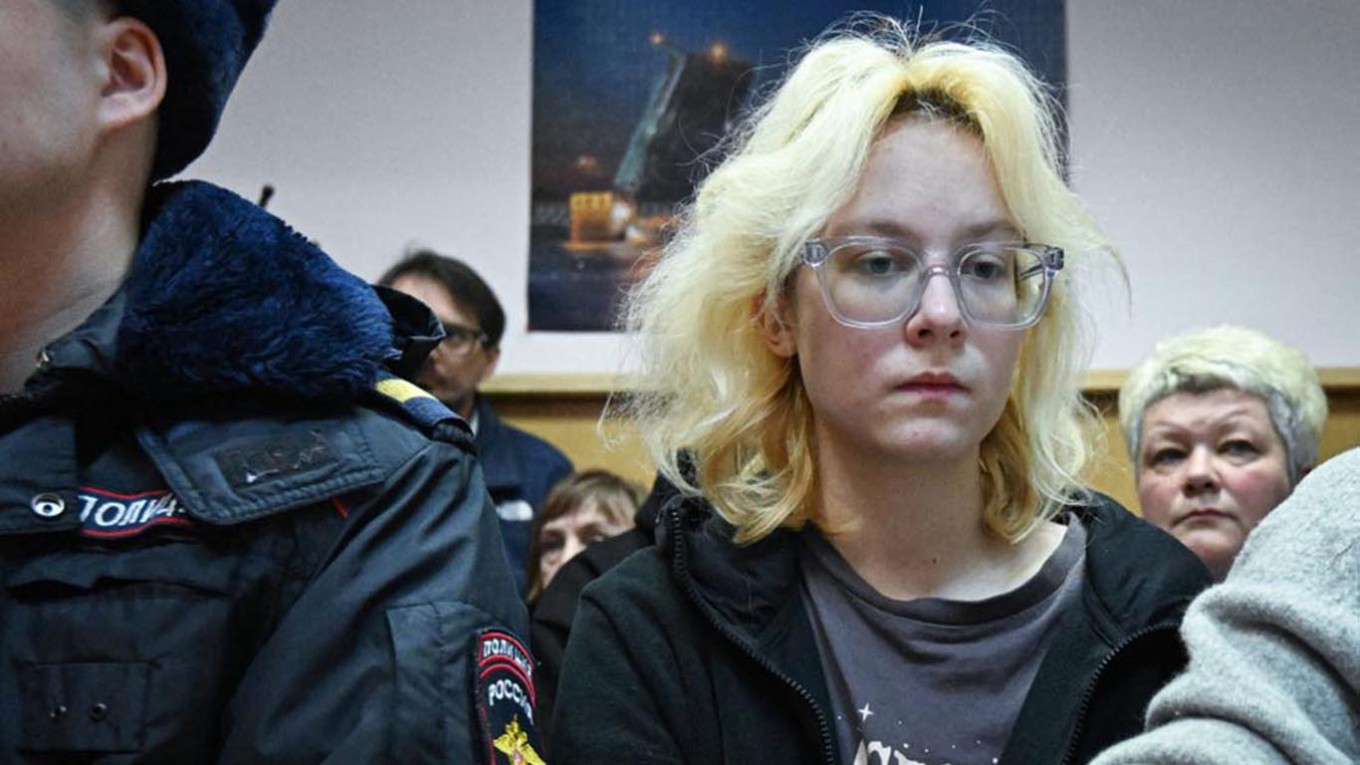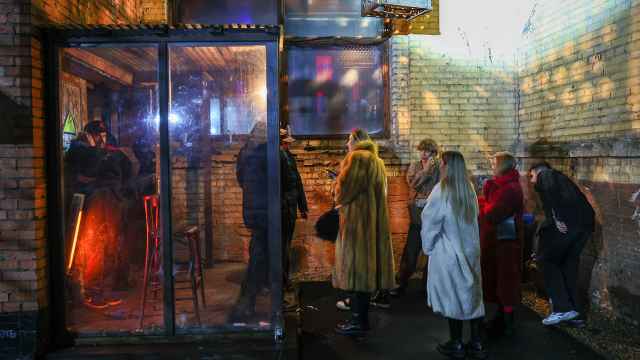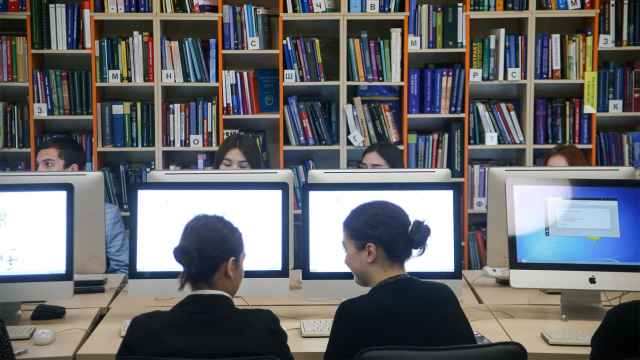There is an idea firmly rooted among the politically active segment of Russian society — both inside the country and among emigres — that the Russian state as something absolutely personalistic. It is believed that all decisions, down to the smallest ones, are made at the very top, almost personally by President Vladimir Putin.
The recent case of the detention of Stoptime band vocalist Diana Loginova, who performed a song by a banned artist, is also illustrative. Many, including well-known opposition figures, immediately said the Kremlin is making a mistake, risking sparking discontent by punishing young people. Implicit in all these statements is the assumption that the decision to detain her was made either in the Kremlin or by people close to it — if not personally by Putin.
But such reasoning comes from an oversimplified and almost mythological idea of the Kremlin as a form of Eastern despotism where one ruler decides everything from foreign policy down to whether someone should be arrested for singing a song on the street.
Yet even in the most totalitarian regimes, it is physically impossible for one person to control every detail. Yes, Putin makes decisions about the war, foreign policy and major strategic directives. But matters like the detention of an unknown singer or a street performer are so far below his level that he may be unaware of it.
Much of what provokes loud debates within the politically engaged public sphere often does not reach the higher leadership of the country at all. Issues that seem extremely significant on YouTube, Telegram channels or among opposition circles may be completely invisible to the broader public and even more so to the president.
The Russian system is, above all, a bureaucratic one with its own internal rules, instructions, fears, and inertia. Its primary goal is to ensure its own survival, with the key task of any official being to demonstrate that he is working and remains vigilant and responsive.
The most dangerous situation for a lowly officer is when everything is calm and nothing in particular needs to be done. In such cases, superiors begin to ask what they’re doing all day and question their competence. It is not enough for civil servants to do their job; they must be seen to do it — even if that means imitating vigorous activity.
Within this system, there exists an unwritten but almost universal rule: if you notice a violation and do nothing, you are guilty.
If you fail to notice it, you are incompetent (as well as guilty).
There is no safe path. Any passivity is a risk. The only way to protect yourself is to act. Or better — to overact. Excessive zeal might earn you a scolding, but inaction leads to questions or even dismissal. It is not the fear of repression, but of losing one's comfort and position.
Let us imagine a police officer receives a complaint that someone is singing a prohibited song in a public place.
As a normal, reasonable person, he might think there was no point getting involved in such nonsense. But then he remembers where he lives. He knows that if he ignores it, and someone records a video, posts it online, or files a complaint, his superiors will ask why he did nothing.
The superior will not think that the officer is a dissident or an enemy of the state. They will think he is simply stupid and doesn’t understand the rules of the game. So the safest option becomes to overreact. That way, if someone higher up ever takes an interest but sees that the officer "acted proactively," they think the system is functioning.
This fear of becoming the one who failed to act, the one who didn't notice or stayed silent, is one of the key psychological springs of the Russian state apparatus. It forces people at the lower and middle levels of power to act on their own initiative, without waiting for orders. They do so not out of ideological hatred, nor because Putin personally instructed them. They act preemptively to avoid blame as the weak link that would attract attention from above.
This is how most repressive mechanisms actually operate: not only from the top downward, but from the bottom upward as well, driven by fear of how the higher authorities might react. Each step is then reported upwards out of extreme vigilance for potential extremism. In the end, it creates the impression that the state consciously decided to fight a girl singing a song on the street, when it all began with one individual who did not want to appear negligent or passive.
Thus, repressive actions are often born not as a direct realization of Putin’s commands but as the result of individuals striving to show that they are doing their job. With every incident being logged, no matter how minor, it starts to look as if initiative was taken from the top. Expecting him to know would be like expecting the CEO of a global corporation to personally investigate who signed a form incorrectly at a local branch office.
Yet the myth that all repressions come from the Kremlin is a convenient way to explain everything and swerve personal responsibility. It is easier to believe that a single villain gave an order than to accept that the system functions in such a way that thousands of individuals every day act as they do because it is safer and more advantageous for them. This myth spares people from uncomfortable questions: Do those who volunteer to kill bear responsibility? Do those who sign search warrants and arrest orders also bear responsibility? It is easier to say they are just cogs with no agency.
But if we are honest, this system is upheld not by one person, but by countless individuals who make decisions locally. Their fears, careers, instincts for self-preservation and desire to demonstrate loyalty create the very environment we call "repressive." And as long as we see only Putin in this, we will not understand how it truly works.
Here, it is important not to confuse responsibility with awareness. Putin bears responsibility because he created and maintains this system of fear. He built it to function automatically, without his participation, according to predictable mechanisms. He built an environment where it is safer to be an overzealous fool than a passive observer.
As a result, we have a system that outwardly looks like a rigid vertical, but in reality, it is a complex pyramid of fear and fealty in which bureaucrats are maneuvering to survive. This is not an Orientalist fairytale autocracy where the sultan personally determines everyone's fate; it is a machine in which each cog tries to spin just enough not to fly out. That is why it is so important to understand that those who oppose the regime are facing not an individual but an entire system of people, rules, habits, fears and career calculations.
Yes, Russia is a repressive state. Yes, it suppresses free thought and expression. Yes, this shows a deep insecurity and fear of any independent public life. But the image of Putin sitting in a bunker, pounding his fists and ordering the arrest of every singer, student or protester is a dangerous simplification.
If we keep thinking that everything comes down to one person, then the solutions will also be simplistic: remove that person, and everything will change. But if the problem lies in the system's design, then the conclusions are very different. One must understand how this machine works, how its motivation is structured and how it can be influenced.
It is also important to speak honestly about personal responsibility. People who voluntarily sign a contract to fight in Ukraine are responsible for their actions. People who detain a singer for a song or write up reports on students are similarly responsible. Not to the same extent as the architects of the system. But still, they are not automatons. This makes the conversation about guilt more complex — but also more revealing.
That is why, when we speak of resisting the system, we must understand that one is not fighting a single man, but the entire power structure. A structure built on fear of losing his superior's favor. On the need to constantly show activity. On an apparatus that is engaged not so much in governance as in self-justification.
Without understanding this, one becomes a victim of one's own propaganda.
So when we ask why a singer was detained and punished for simply speaking her mind, we must remember it was not the sole doing of the tsar.
It is the system he built and has since taken on a life of its own. If anyone seriously wants to change it one day, they must begin with understanding this without illusions or simplifications.
A Message from The Moscow Times:
Dear readers,
We are facing unprecedented challenges. Russia's Prosecutor General's Office has designated The Moscow Times as an "undesirable" organization, criminalizing our work and putting our staff at risk of prosecution. This follows our earlier unjust labeling as a "foreign agent."
These actions are direct attempts to silence independent journalism in Russia. The authorities claim our work "discredits the decisions of the Russian leadership." We see things differently: we strive to provide accurate, unbiased reporting on Russia.
We, the journalists of The Moscow Times, refuse to be silenced. But to continue our work, we need your help.
Your support, no matter how small, makes a world of difference. If you can, please support us monthly starting from just $2. It's quick to set up, and every contribution makes a significant impact.
By supporting The Moscow Times, you're defending open, independent journalism in the face of repression. Thank you for standing with us.
Remind me later.








